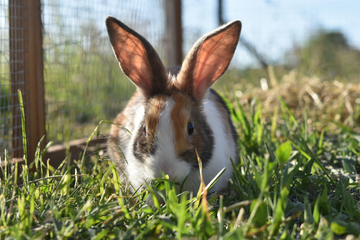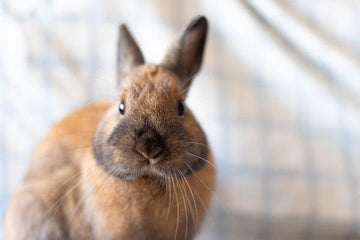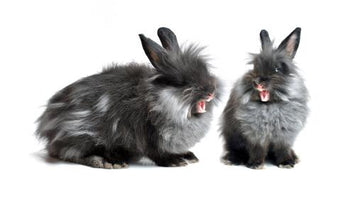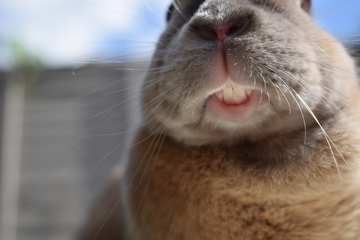The Best Food for Rabbits in Summer
As the temperature rises, your rabbit's nutritional needs can change. During the summer months, staying hydrated and cool becomes a priority. The right diet can help your bunny maintain a healthy weight, prevent heat stress, and support overall well-being. Just like we switch to lighter meals in the heat, your rabbit can benefit from a seasonal menu shift, too.
Click Here For a Guide to Understanding Your Rabbits Diet.

Top 5 Summer Foods for Rabbits
1. Fresh Hay
Timothy Hay should always be a staple in your rabbit's diet. It helps with digestion and keeps their teeth in check. While it's great year-round, it's especially important in summer to maintain fiber intake when adding more watery foods like vegetables and fruits to their diet.
2. Leafy Greens
Offer a variety of leafy greens such as romaine lettuce, cilantro, and parsley. These are not only hydrating but also provide essential nutrients. Avoid giving too much spinach or kale due to their high calcium content, which can lead to health issues. Always wash the greens thoroughly to remove any pesticides.
3. Safe Herbs
Herbs like basil, mint, and dill can be refreshing for your rabbit. Mint, in particular, has a cooling effect that can be soothing in hot weather. Introducing small amounts at a time can help you gauge your rabbit's preference and tolerance.
4. Water-Rich Vegetables
Cucumber and zucchini are excellent choices for adding moisture to your rabbit's diet. They are low in sugar and high in water content, which helps keep your bunny hydrated. Remember to offer these vegetables in moderation to avoid digestive upset.
5. Limited Fruits
Fruits like strawberries, blueberries, and watermelon (without seeds) can be occasional treats. They should make up no more than 10% of your rabbit's diet due to their sugar content. Serve in small, bite-sized pieces to prevent any gastrointestinal issues.
Foods to Avoid in Summer
While some foods can be given more generously during summer, others should be avoided:
- High-Calcium Vegetables: Spinach, kale, and beet greens can lead to urinary issues.
- Iceberg Lettuce: Contains too much water and too few nutrients, which can cause diarrhea.
- Frozen Treats: Though it might seem cool, frozen treats can upset a rabbit's stomach.
Keeping Your Rabbit Hydrated
Water is the most crucial component of a rabbit's diet, especially in summer. Ensure they have access to clean, fresh water at all times. Consider using a heavy ceramic bowl that they can't tip over. Adding a second water source, like a bottle, can be a good backup during hot days.

Adjusting Portion Sizes and Frequency
Rabbits may eat less in the summer due to the heat. Monitor their food intake and adjust portion sizes accordingly. If your rabbit eats fewer pellets, offer more leafy greens to balance their diet. Avoid feeding during the hottest parts of the day; early morning and late evening are ideal.
Summer Treat Recipes for Rabbits
Here are a couple of easy, bunny-safe recipes to keep your rabbit cool and happy:
1. Mint and Basil Ice Cubes
Blend fresh mint and basil leaves with water, pour into ice cube trays, and freeze. Drop one or two cubes into their water bowl for a refreshing treat.
2. Veggie Pops
Puree water-rich vegetables like cucumber and zucchini. Spoon the mixture into small molds and freeze. Offer these veggie pops occasionally to prevent dehydration.
Signs Your Rabbit Might Be Overheated
It's important to watch for signs of heat stress in your rabbit during summer:
- Rapid breathing or panting
- Floppy ears or laying stretched out
- Reddened ears
- Drooling or wet around the mouth
If you notice these symptoms, immediately move your rabbit to a cool, shaded area and offer water. You can place a damp cloth over them or provide a frozen water bottle wrapped in a towel for them to lie against. If symptoms persist, consult your vet right away.
Conclusion
Feeding the best food for rabbits in summer involves more than just a healthy diet. It's about keeping them cool, hydrated, and comfortable during the hot months. Stick to fresh hay, leafy greens, water-rich veggies, and a few safe fruits to keep your bunny happy and healthy. If you're unsure about a new food, consult your veterinarian.

Not summer?, check out our blog on winterizing your rabbit's hutch to prepare for winter. Happy summer, and happy feeding!

Rabbit Is It Low Maintenance or More Work Than You Think?

Signs of Rabbit Health: What You Should Know

Decoding Bunny Behavior: Understanding Rabbit Mood







